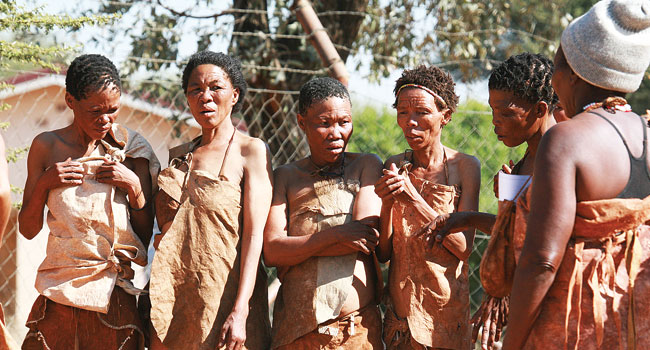- District Commissioner, Council leadership, Jumanda Gakelebone’s land bid rejected
- Delegation met with four Ministries to deliver appeal
TEFO PHEAGE
The government has rejected in no uncertain terms a high-level delegation from the people of Gantsi, who are appealing for the zoning of the Central Kalahari Game Reserve into -a wildlife and residents’ habitat.
The proposal was delivered to the head of the four Ministries responsible for overseeing the reserve- Pelonomi Venson-Moitoi last-month by the Gantsi District Commissioner, Loeto Porati, Council Chairperson, Galetlhaole Sixpence, Council Secretary- Mabaila and four Councillors, long time Basarwa Spokesperson, Jumanda Gakelebone, CKGR Councillor, Bashi Thiite and the other two, Elizabeth Mokomo and Kaguu Ezekiel.
The proposal follows a “go and see” Council trip to the reserve where a number of observations were made by Councillors, which was prompted by the continued human-wildlife conflict and the involvement of the wildlife personnel who continue to clash with Basarwa for allegedly bringing disharmony into a wildlife management area.
The delegation found that government has failed to arrest the situation and should admit its failure and demarcate the reserve to avoid future conflict and erosion of the CKGR residents’ fundamental rights. The reserve currently has an estimated population of 800 inhabitants. Additional findings have raised concerns that wildlife officers are not properly trained to deal with the human wildlife conflict resulting in the perpetual clashes between the inhabitants and council authorities.
The delegation wants the Ministry to help declare the CKGR inhabitants’ stay in the park as legitimate to stop or minimize constant confrontations between them and those who claim to be enforcing the law.
Moitoi however informed the delegation that it is not possible to agree to the position of the delegation as the reserve is a business area and urged them to advise Basarwa to apply for land outside the reserve. She further informed the delegation that she will deliver the full response in person to the Council during the next full council meeting, as she still has to pass it through other relevant stakeholders.
In 2014, UN Special Rapporteur on cultural rights Farida Shaheed visited the reserve and noted that, “The fear amongst affected people is that once the elders have passed away, nobody will be entitled to live in the reserve. Furthermore, insisting that people relocate outside the reserve for wildlife conservation purposes is at odds with allowing the continuation of mining and tourism activities.”
Moitoi however dismissed the report at the 31st Regular Session of the Human Rights Council in Geneva, Switzerland saying the Government of Botswana, “would like to state that the observations by the Special Rapporteur are inconsistent with the relocation and the ruling on the CKGR case. The Government did not forcefully relocate Basarwa from the CKGR”. Government controversially adopted the interpretation of the High Court Judgement despite the Court’s declaration that Basarwa were evicted without their consent. The court found that Basarwa were evicted “wrongfully and unlawfully and without their consent”.
In 2002, UN Special Rapporteur on the rights of indigenous peoples Rodolfo Stavenhagen visited a resettlement camp and found that the Basarwa were victims of “discriminatory practices,” and were being “dispossessed of their traditional lands.” Later the same year, the UN Committee on the Elimination of Racial Discrimination expressed concern at the “ongoing dispossession of Basarwa/San people from their land.”
In 2007, Stavenhagen’s successor, James Anaya, and UN Special Rapporteur on the right to food Jean Ziegler wrote to the Botswana government. They had found that the High Court decision was still not being implemented, and that as a result the Basarwa “kept facing numerous impediments in the effective enjoyment of their rights over their traditional lands and resources.”
In 2008, the UN Human Rights Committee urged Botswana to ensure that “all persons who were relocated are granted the right to return to the CKGR (Central Kalahari Game Reserve).”
In 2009, the UN Human Rights Council carried out a review of Botswana, in which Finland urged Botswana to “ensure respect for the rights of the indigenous people living in the areas of interest to companies active in the diamond business,” and Denmark urged them to “provide access to land and support for the residents of the reserve, as specified in the United Nations Declaration on the Rights of Indigenous people.”
In 2010, the UN Committee on the Elimination of Racial Discrimination wrote to the Botswana Government, saying that: “In 2006 the High Court of Law ruled that their eviction was unlawful and unconstitutional… The Committee is concerned about the alleged lack of implementation of the High Court of Law’s decision.”
In 2013, during the Universal Periodic Review of Botswana at the UN, the United States expressed “concern at a narrow interpretation by the High Court, which prevented hundreds of [Bushmen] from living and hunting on their ancestral lands,” and the United Kingdom called the progress in negotiations between the Botswana Government and the Kalahari Bushmen a “matter of urgency.”

